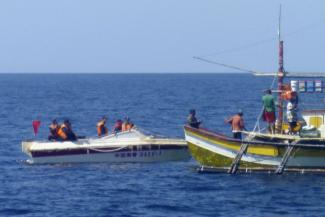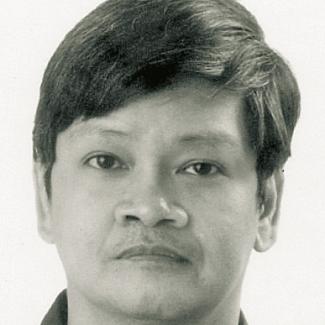Law of the sea
Pivoting Philippines

Just a year ago, when Benigno “Noynoy” Aquino was still president, Philippine diplomacy was on a straight and steady course. Manila wanted an international tribunal to decide on China’s claim to control the entire South China Sea. The Aquino administration insisted on arbitration in the context of the UN Convention on the Law of the Seas (UNCLOS). The idea was to handle the dispute in a multilateral context and build ties to the leaders of other nations who were concerned about Beijing’s maritime encroachments.
The policy was actually quite successful. In July last year, a UNCLOS tribunal in The Hague ruled in favour of the Philippines, though Beijing refused to accept its decision. The Communist regime claims sovereignty over the entire area with a historical map that uses a spurious “nine-dash line”. The line extends all the way down the coast of Vietnam to Malaysia and back north along the Philippines’ most eastern islands. The line is not defined precisely, but it clearly infringes upon several countries’ exclusive economic zones as defined by UNCLOS.
In the past, all governments concerned rejected China’s territorial claims. Today, however, it has become uncertain where Manila is headed. Even though the Philippines won the arbitration case, the country’s new administration has suddenly set the decision aside, flung itself into Beijing’s arms and basically left the allies it was courting standing open-mouthed.
The reason is the election of President Rodrigo Duterte, the bloodthirsty populist ex-mayor of Davao City (see essay by Alan C. Robles in D+C/E+Z e-Paper 2017/02). During the campaign, he never clarified his position on the South China Sea dispute. In fact, he rambled like a drunkard: he vowed, for example, that he would ride a jet ski to contested rocks and plant a Philippine flag on them to defy China.
After taking office, however, he swiftly set a new course for foreign policy. He repeatedly insulted the United States, called then president Barack Obama a “son of whore” and threatened to abrogate all security arrangements with the superpower. Then he went to Beijing and grovelled before the Communist leadership. Without ever mentioning the dispute over the South China Sea, he told his counterpart Xi Jinping: “This is the springtime of our relationship.” Duterte also said “it was time to say goodbye” to the USA and promised the Chinese leadership: “I will be dependent on you for all time.”
It was all music to his delighted hosts’ ears. After kowtowing before the emperor in a 21st century style, Duterte went home loaded with gifts: billions of dollars in loans, agreements concerning trade, investments and security, promises of infrastructure financing as well as a green light for planeloads of Chinese tourists and investors.
There are speculations concerning the reasons for this spectacular diplomatic turnaround. One is that Duterte hates the US because it once rejected his visa application. Others are that China secretly supported his election campaign or is furtively providing medical care to the 71-year old ailing president.
The most generous interpretation of the Philippine pivot is that Duterte is playing the wily Filipino, hedging the country’s bets by pitting two powers against each other. Despite Duterte’s rhetorical outbursts, he has not actually upset security arrangements with Washington, nor has he moved to eject the five military bases the US currently maintains in the Philippines.
If this reading is correct, Duterte is playing a delicate game. To begin with, China has not budged one inch from its position, which is that it “indisputably” owns the entire South China Sea, as nebulously defined by its nine-dash line. Beijing has never clarified just how far the dashes are from the coast. It is obvious, nonetheless, that the line slices into the Philippines’ exclusive economic zone and runs very close to the coastline of Luzon, the archipelago’s most important and most populous island.
Military dimensions
The issue is of great geostrategic relevance. China has seized rocks and shoals in the sea and has begun building them as islands hosting full-blown military installations. According to the US military, the new bases could soon bristle with missiles, turning the world’s busiest sea-traffic lane into something resembling a Chinese lake. Accordingly, the US Navy is paying close attention.
Some Filipinos argue the Philippines would be unable to defend the territory against China anyway, so it is best to let the area go. They fail to see the difference between having territory grabbed and giving it away willingly. If Manila surrenders to China now, it will be very difficult to dispute Chinese ownership of the South China Sea in the future.
Moreover, the people who argue this appeasing way are probably unaware of how much is at stake. Alfred McCoy is a historian from the University of Wisconsin-Madison, who specialises in the Philippines. He tells people to “look at the map”, pointing out that the Philippines’ exclusive economic zone in the South China Sea is equivalent “to about a third of the country’s existing sovereign territory”. He adds that this is the planet’s “richest fishing ground”, which will provide protein to future generations.
McCoy says that if Manila were to simply give up the fishing grounds, as well as the hydrocarbons beneath the surface, the Philippines’ economic growth would suffer. In the scholar’s eyes, Duterte is playing a “dangerous game” in placating China, because Filipino nationalists might become concerned about what the country might be surrendering. The legal UNCLOS victory was important, McCoy argues, but the new president has “virtually abrogated that”.
While Duterte’s foreign policy pivot represents a drastic – and probably long-needed – change in its largely subservient relationship to the US, Manila is finding out that its new best friend can also be testy and demanding.
In late February, Perfecto Yasay, Duterte’s foreign secretary, told reporters: “We vehemently object to China’s claim pertaining to the nine-dash line.” He added: “If China will attack us, we can only defend ourselves and make sure that our sovereign rights are recognised as we assert them.” Yasay also said that ASEAN was concerned about China’s militarisation of its artificial islands.
The backlash was immediate. Beijing cancelled a scheduled trip of China’s commerce minister to Manila. He was supposed to sign contracts for 40 projects worth billions of dollars. A spokesman for China’s foreign ministry called Yasay’s words “baffling and regrettable.” Duterte stepped in with a statement according to which his foreign minister had been “misunderstood”. The Senate later forced Yasay to resign because of awkward questions of citizenship. In the meantime, it has turned out that Duterte gave China the go-ahead to explore the Benham Rise, a resource rich area off the Philippines’ Pacific coast. He did not inform anyone else in the government.
Longer than the constitution allows
China is certainly happy with its man in Manila. In February, Zhao Jianhua, the Chinese ambassador to the Philippines, openly called for Duterte to be granted emergency powers – ostensibly to solve infrastructure problems such as traffic. He said the Chinese were afraid of “taking up projects that go beyond the presidential term” – a hint that China would like to see Duterte lead the country longer than the constitutionally mandated single six-year term. Political observes in Manila, however, know that Duterte himself is quite keen on emergency powers and would like to become a dictator without constitutional constraints.
Duterte’s close embrace of Beijing also runs against the inclination of Filipinos in general and the military in particular. The country’s armed forces are organised, trained and equipped along US lines, and many officers were trained in the USA.
Finally, complicating matters is the election of Donald Trump, a leader who seems similarly unbalanced and unstable as Duterte. The US president’s promise to build up the military, and his perception of China as a threat, is likely to intensify tensions concerning the South China Sea. The Philippines would be a frontline state in any potential conflict. So far, Duterte seems to be getting along with Trump, but his pro-Beijing policy may yet run into opposition from Washington.
For decades, Filipinos have happily led insular lives away from the geopolitics of the Asian mainland. Now they have awakened to find that, in a simmering confrontation between China and the US, the Philippines is of crucial relevance. They are discovering, in short, that as Napoleon is supposed to have said, “geography is destiny”.
Alan C. Robles is a freelance journalist who lives in Manila.
editor@hotmanila.ph








